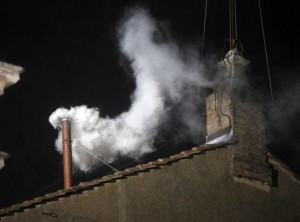 For the first time, a South American, Jorge Mario Bergoglio from Argentina will be the Pope, taking the name Francis. Electing a new pope involves of course a host of traditional rituals and practices, most of which have remained the same for centuries. Modernizations such as use of cell phones or social media are taboo. From a cultural perspective, the process is particularly interesting in its linguistic and non-verbal dimensions. As was the case when Pope Benedict announced his surprise resignation, Latin is the language used to announce the election of the pope (habemus Papam – we have a pope), with the name of the new pope Latinized, including having his first name put into the accusative case. Speakers of language which don’t use a lot of inflections (like English) often have a hard time with proper names being declined. Dealing with names in context is always a stumbling block for learners of Russian, for example.
For the first time, a South American, Jorge Mario Bergoglio from Argentina will be the Pope, taking the name Francis. Electing a new pope involves of course a host of traditional rituals and practices, most of which have remained the same for centuries. Modernizations such as use of cell phones or social media are taboo. From a cultural perspective, the process is particularly interesting in its linguistic and non-verbal dimensions. As was the case when Pope Benedict announced his surprise resignation, Latin is the language used to announce the election of the pope (habemus Papam – we have a pope), with the name of the new pope Latinized, including having his first name put into the accusative case. Speakers of language which don’t use a lot of inflections (like English) often have a hard time with proper names being declined. Dealing with names in context is always a stumbling block for learners of Russian, for example.
The non-verbal communication surrounding the election of the pope is extensive. As soon as the cardinals emerge from the conclave, one can identify visually the new pope by the fact that he is the only one dressed in white. There was a lot of debate after Pope Benedict’s resignation about what color his vestments would be, white, red or black. Even more interest was generated by his shoes – he will be giving up the red shoes typically worn by popes (symbolizing the blood of the Christian martyrs). The other interesting non-verbal message involved in the process is the use of smoke signals, not the array of signals used by Native Americans and other indigenous peoples, but simply black smoke from the Vatican chimney for a ballot round with no winner or white smoke indicating Papam habemus.
